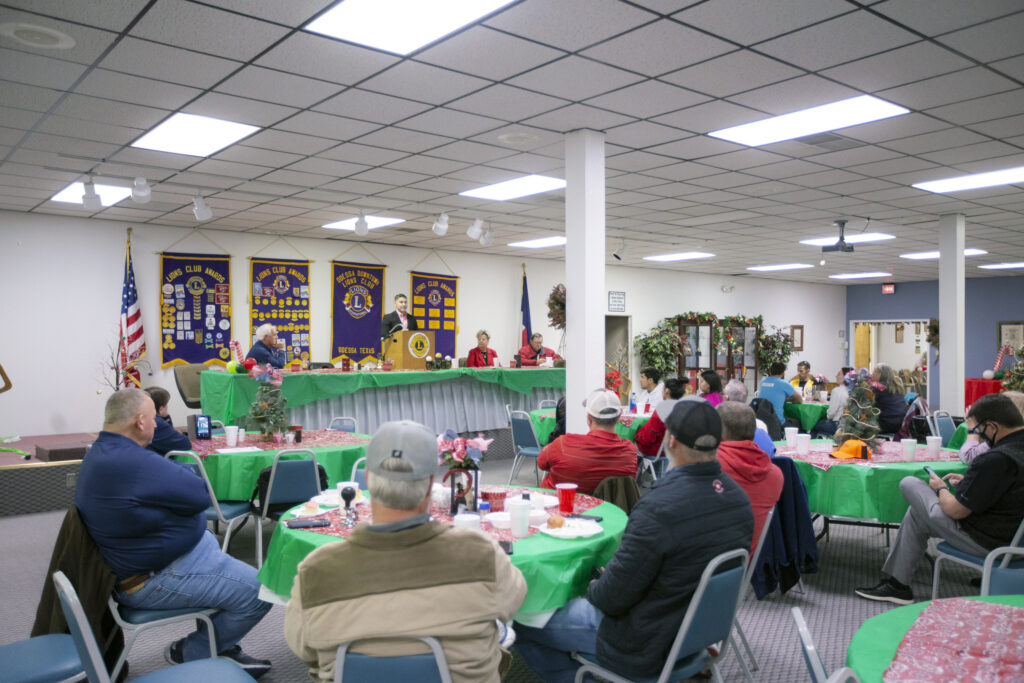Ector County Judge Debi Hays and Dustin Fawcett presented their political stump speeches to the Downtown Lions Club Thursday afternoon, but things only heated up during the Q&A portion of the event.
One of the audience members asked Hays “if there was an explanation for why the hospital has not been awarded or considered for” the $32 million in American Rescue Plan Act funds Ector County will eventually receive. The county has already received half.
Medical Center Hospital asked for $7 million in ARPA funding and Odessa Regional Medical Center requested $2.6 million, but the county commissioners voted 5-0 in September to hire an administrator to vet applications and conduct audits before moving forward on any requests.
Hays explained their reasoning Thursday.
“With the ARPA money comes a lot of strings; it’s like a spider’s web,” Hays said. “Because the county does not have the staff to manage $32 million to make sure that it is spent correctly, the federal money, the commissioners court decided that they’d go out for bid to try to hire an institute to help us with the expenditure of that money to make sure that in the event any of that money was not spent based on federal guidelines, that they, too, would be responsible for it and not the taxpayer.”
Later this month, the commissioners will announce who will administer the funds and to whom the money will go, she said.
“I can promise you that Medical Center and ORMC are at the top of our list,” Hays said.

Fawcett, who is currently the manager of MCH’s ProCare Clinic, responded by saying he was “embarrassed” and saddened by the court’s decision.
Had the county given MCH the $7 million by Dec. 31, FEMA would have reimbursed the funding and the county would have been paid back 100%, Fawcett said.
“We failed on that. We passed that 100% deadline so even if we allocate money now, coming up after this third party firm says we should allocate money, we lost that 100% reimbursement,” Fawcett said. “That is an issue. That is a huge issue.”
Fawcett also questioned the hiring of an administrator in the first place. While there may have been strings attached to the funding, he said there weren’t nearly as many as with Coronavirus Aid, Relief, and Economic Security Act or CARES Act money.
“Why do we have elected officials if we’re going to hire people to tell us how to spend our own money? I have an issue with that,” Fawcett said. “And we’re saying we don’t have enough staff… Why don’t we have enough staff? Because we gutted our County Attorney Office and that’s an issue in and of itself. The county attorney should be watching out for the folks, the way in which we handle money and the way in which we get those federal dollars. To say it comes with too many strings, that’s your job.”
Losing out on that money was “inexcusable,” Fawcett said, noting many counties had already determined how they were going to spend the funds months ago.
Given a chance to respond, Hays said it’s easy to stand on the sidelines and tell coaches how to coach.
“Knowing that $32 million is almost 50 percent of the entire county budget and if it’s not spent correctly and if any of the money has to be paid back then it will fall on your shoulders… I don’t feel like the decision to hire another firm was a wrong decision to protect your money,” Hays said. “Evidently there were four other people who felt the same way because it was a 5-0 vote.”
During the speech portion of the event, Fawcett, 30, provided details of his background and said his platform is about infrastructure, institutions and innovation.
Fawcett’s grandfather and mother are from Odessa, but he grew up in the Dallas/Fort Worth area. He studied political science at Millsap College in Jackson, Mississippi and worked summers in Odessa in the oil and gas industry.
He worked for State Rep. Brooks Landgraf and was vice president of the Midland-Odessa Transportation Alliance from 2018 until last May when he made the decision to oppose Hays.

“Why am I running? I truly believe that Ector County is on the cusp of something really amazing and approaching a new realm in oil and gas with a combination of digital, with a combination of technology, really with where Texas is as a tremendous attractor of jobs and growth,” Fawcett said. “Ector County really has a chance to stand out, it already is standing out. We often times don’t see it because we’re in the midst of it, but we really have an opportunity to up our game. We really need somebody who has been in the weeds, literally reading the white paper about the economics and demographics of the region to really advocate and make sure that we have proper policies as we go forward.
“I tell people I’m not in politics, I’m in public policy.”
Fawcett said the county needs to make short, medium and long-term plans for its roads, and take an inventory of the county’s buildings in terms of their lifespans, maintenance and functionality. Perhaps, he said, county services could be combined into select buildings.
Fawcett also said the county needs to work with health care institutions, the area’s colleges, the Odessa Chamber of Commerce, nonprofits and neighboring governments. For example, he said the county could work with the universities to develop workforce development programs and internships.
He also said the county should look out for ways to be innovative.
The $7 billion Nacero project, which will ultimately turn natural gas into gasoline, “needs to be the norm, not the exception,” Fawcett said.
Hays told the group that because of her 40 years of business experience, the county is in a better position than it was when she took office four years ago.
She said the county’s budget has grown by $23 million to $89 million, which is helping to pay for staffing for a law enforcement center addition, an environmental enforcement unit and healthier road and bridge budgets, she said.
While the pandemic has held up the delivery of a backhoe, dump truck and other equipment, residents should soon see improvements on their roads, Hays said.
The county judge also noted that she’s been selected to chair the Interstate-20 improvement project.
Voters will decide between the two in the March 1 Republican primary. There is no Democrat in the race. The last day to register to vote is Jan. 31. Early voting begins Feb. 14 and ends Feb. 25.




